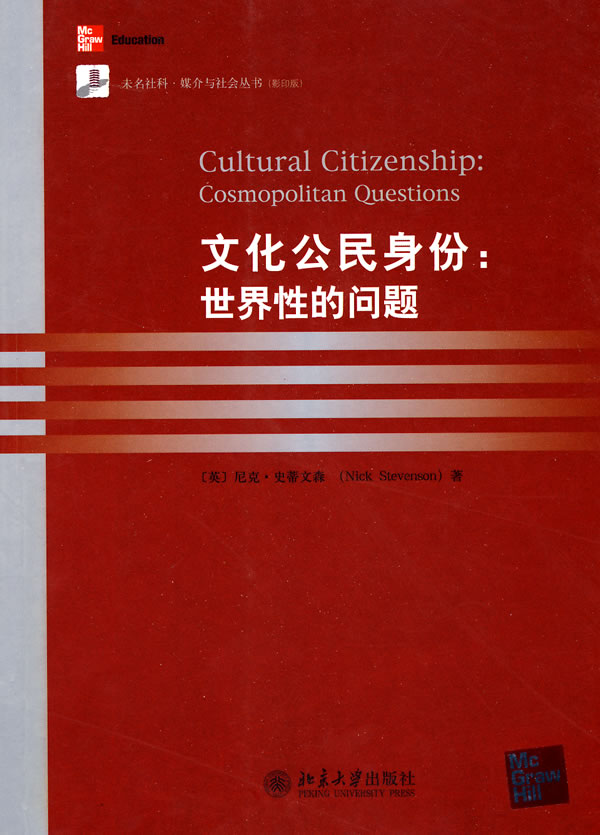
文化公民身份-世界性的问题

- ISBN:9787301170199
- 装帧:一般胶版纸
- 册数:暂无
- 重量:暂无
- 开本:16开
- 页数:176
- 出版时间:2010-03-01
- 条形码:9787301170199 ; 978-7-301-17019-9
本书特色
《文化公民身份:世界性的问题》:未名社科·媒介与社会丛书(影印版)
内容简介
为什么“文化”成为政治争论的核心?
在信息时代,我们应该如何重新思考公民身份的问题?
什么是世界主义?它会成为未来的基本典范吗?
本书将身份、个性化、文化多元主义与调解纳入文化政治学的研究范畴,从政治学理论、文化研究和社会学的争论中借鉴经验,集中讨论了如下问题:
·全球化引致的公民身份重塑
·新社会运动
·民族-国家的衰落
·流行文化的冲击
史蒂文森认为,世界主义的问题越来越有可能出现在这些领域。无论我们在讨论环境破坏,还是文化政策、城市、消费者文化的议题,这些问题都可能与世界主义的维度有关。权利、义务和文化方面的议题如今都已成为我们思考这个世界的中心内容。这本原创性的著作提请我们重新思考什么样的政治和人格才是适应信息时代的。
目录
acknowledgements
introduction
1 cultural citizenship
t.h. marshall and raymond williams: a cultural citizenship?
cultural citizenship in the information age
the culturation of citizenship
civil society, culture and public space
identity, difference and cultural politics
the challenge of individualization
conclusion
notes
further reading
2 cosmopolitan and multicultural citizenship: world, nation, city and self
disarmament and european cosmopolitanism
the new political cosmopolitans
national citizenship: liberalism and multiculturalism
multicultural citizenship: iris marion young, will kymlicka and bhikhu parekh
cosmopolitanism and multiculturalism
the city as a contested space
cosmopolitan cultures and cosmopolitan selves
conclusion
notes
further reading
3 ecological and cultural citizenship: across the nature/culture divide
culture and nature
cosmopolitan and ecological citizenship
modernity, progress and consumption
risk, science and democracy
cinematic representations of risk: safe
cyborg relations: humans, animals and technology
vulnerability, voice and community
conclusion
note
further reading
4 media, cultural citizenship and the public sphere
media, citizenship and cultural power
cultural citizenship in a global mediated culture
human rights, social movements and global media
technocultures, media and community
speed and communication
moral indifference and cosmopolitanism
media, popular culture and the deconstruction of public and private
conclusion
note
further reading
5 consumerism, cultural policy and citizenship
consumer culture and the death of citizenship
consumer culture as citizenship
questions of cultural capital
cultural policy and questions of governance
a 'common' cultural citizenship
conclusion
further reading
6 cultural citizenship: a short agenda for the future
glossary
bibliograpuy
index
节选
《文化公民身份:世界性的问题》内容简介:为什么“文化”成为政治争论的核心?在信息时代,我们应该如何重新思考公民身份的问题?什么是世界主义?它会成为未来的基本理念吗?《文化公民身份:世界性的问题》将身份、个性化、文化多元主义与文化政治联系起来,并从政治学理论、文化研究和社会学的争论中借鉴经验,集中讨论了如下问题:全球化对公民身份的重塑;新社会运动;民族一国家的衰落;流行文化的冲击。史蒂文森认为,世界主义的问题越来越有可能出现在这些领域。无论我们在讨论环境破坏,还是文化政策、城市、消费者文化的议题,这些问题都可能与世界主义的维度有关。权利、义务和文化方面的议题如今都已成为我们思考这个世界的中心内容。这本原创性的著作提请我们重新思考什么样的政治和人格才是适应信息时代的。
相关资料
But crucially involves the direct intervention of ethical communities,feminist campaigners, green networks, religious denominations, trade unions,ethnic organizations and parents' groups. A society-wide conversation isdependent upon the emergence of an 'energetic civil society' that is able to forceissues and perspectives on to a public agenda. A robust civil society ensures thatthe communicative basis of society never becomes completely colonized byagencies of money and power. Civil society, then, under certain circumstances,is able to convert itself into communicative power through the channels ofpublic communication and the activation of public normative sentiment. Forthe public sphere to be socially just, it must both prevent the manipulation ofthe public by forces with vested interests in social control and pull togetheran otherwise fragmented public. A widespread, publicly inclusive conversationwould shatter attempts at 'information processing strategies' and replace themwith genuinely communicative interests and passions. A communicative civilsociety would produce a cultural citizenship where the public were capable oflearning from one another's viewpoints. The creation of a robust civil society is, however, constantly threatened by thecolonizing capacity of money and power. According to Benjamin Barber (2001)there are at least three dangers to the creation of an engaged civil society.The first is the bureaucratic mechanisms of government that seek to manageand limit public criticism. These can emerge through hegemonic strategiesof 'incorporation' and exclusion, censorship and the division of oppositionalsentiments. The second is the belief that markets promote democratization.Markets tend to promote individualistic goals and choices, limiting our capacityto deliberate upon the common good. Finally, civil society is threatened by ayearning for undifferentiated and homogeneous communities. Whereas marketsfoster individual yearnings, they uninte
作者简介
尼克·史蒂文森(Nick Stevenson)英国诺丁汉大学社会学与社会政策学院高级讲师,著有《文化、意识形态和社会主义》(1995)、《媒介的转型》(1999)、《文化与公民身份》(2001)、《读懂男性杂志》(与彼得·杰克逊和凯特·布鲁克斯合著)(2001)、《理解媒介文化》(2002)等著作。
-

毛泽东选集(全四册)
¥63.4¥97.5 -

为什么是中国(九品)
¥29.0¥58.0 -

毛泽东选集(普及本)(全四册)
¥52.8¥81.0 -

走向海洋(八品)
¥16.2¥59.8 -

马克思主义:赞成与反对
¥9.5¥35.0 -

论共产党员的修养
¥2.3¥5.5 -

兄弟连-纪念版
¥13.3¥38.0 -

走向海洋
¥16.1¥59.8 -

秘密访问-中美关系破冰亲历
¥9.0¥28.0 -

中国的婚姻与家庭
¥15.1¥39.8 -

毛泽东选集-(第三卷)
¥14.6¥18.0 -

浴血荣光
¥16.2¥45.0 -

(平装)二战战史
¥11.7¥45.0 -

步兵攻击:隆美尔手绘插图珍藏本
¥13.5¥45.0 -

1793乾隆英使觐见记(九品)
¥9.8¥39.0 -

国之脊梁:中国科学家的家国天下
¥37.7¥59.8 -

为什么是中国
¥29.0¥58.0 -

中国抗日战争史简明读本
¥12.3¥30.0 -

共产国际与广州国民政府关系史
¥16.8¥56.0 -

毛泽东自述(增订本)
¥43.5¥58.0











